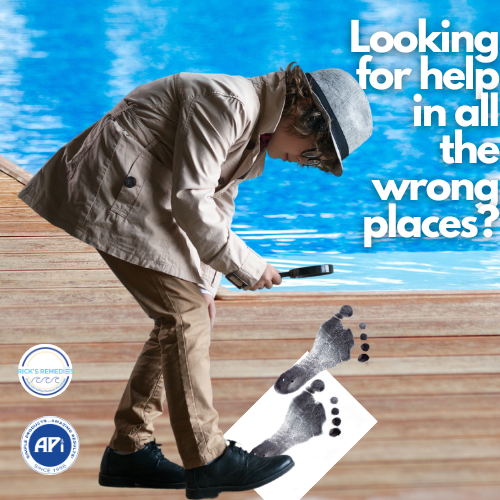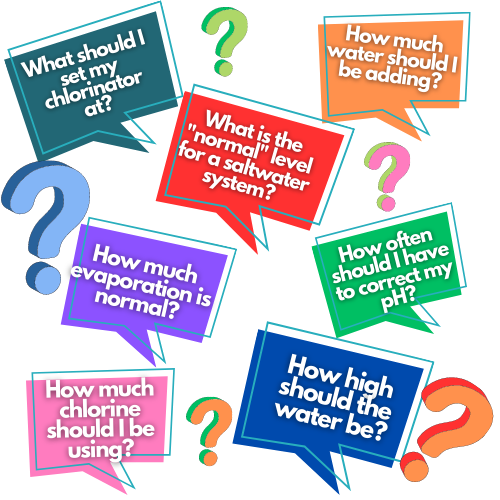Rick's Remedies: Looking for help in all the wrong places?


These are ALL valid questions, but EVERY pool is different.
So, where to turn for advice?
Friends? Online forums? Social media?
A world where pool care is as simple as following the same simple instructions from people online does have a certain appeal to it... "@Hankpoolpro420 online told me to do this, I did it and it didn't work...well, at least now I can blame him for the problem I am having with my pool...Hank must be a real idiot, right?" Not necessarily...the truth is, Hank may be using his method and seeing much success with it. But when you try it, it is an #epicfail. That is because EVERY.POOL.IS.DIFFERENT. Looking to other pool owners for advice may seem logical, but keep in mind, they don't have the same pool as you. They may not use it the same way you do, and sometimes...the Hank's of the Internet are just flat out wrong and give garbage advice. (Stay tuned, that is a topic for another day!)
The key to troubleshooting water issues is to identify what makes your pool unique and then taking that information to solve or prevent specific problems most commonly associated with your specific set of attributes. Look at EVERY variable. How much does your pool get used? How much water splashes out while swimming? Does your dog like to swim? Do you have well water? Have a flock of sparrows taken an affinity to a nearby tree branch and been making "deposits" in or around your pool all day? What's the weather been like? What types of fertilizers are used by farmers and/or landscapers in your area? Do you have a teenage daughter who likes to invite her friends over to sit out by the pool drenched in tanning oil? Do you have little ones who sometimes forget to take potty breaks? These are just a FEW of the things that are often overlooked when troubleshooting water chemistry issues, but that play a BIG role in throwing off your pool's water balance. Each one can require different approaches to remedy the issues you are experiencing in your pool. Proper education and observations can make operating your pool much easier, not to mention less time consuming and expensive. Eventually, you will become so seasoned, you will be able to predict potential problems and take the necessary steps to avoid them ahead of time! No crystal ball needed.
So, where does one go to find this type of accurate and useful information?
These are a few suggestions we have (you'll notice that NOWHERE on this list does it say social media-that is on purpose):
Product Instruction Manuals
Find out what kind of equipment you have on your pool and seek out the manuals for that equipment. You can most always find these manuals FREE online.
Pool Training Organizations
Investigate residential pool operations training courses or guides.
Local Bathing or Swimming Pool Codes
These are the required guidelines for commercial swimming pools. If these guidelines are good for commercial pools, they are good for residential as well!
Pool Professionals
Ask folks who do this sort of work for a living. They generally have a lot of experience with a wide range of problems. They may have already successfully dealt with the same issues you are experiencing and can offer professional advice on how to best resolve your problems.
Finally, be weary of those who say their method is the only way to take care of a pool. These folks often say things like, "I've had a pool for 30 years and I always blah, blah, blah. It's the best and only way!" Just like when traveling and arriving to a specific destination, there is usually more than one way to get there.
If you have pool chemistry issues that are leaving you frustrated and confused, give us a call!
We can help!
(877) 274-7261









